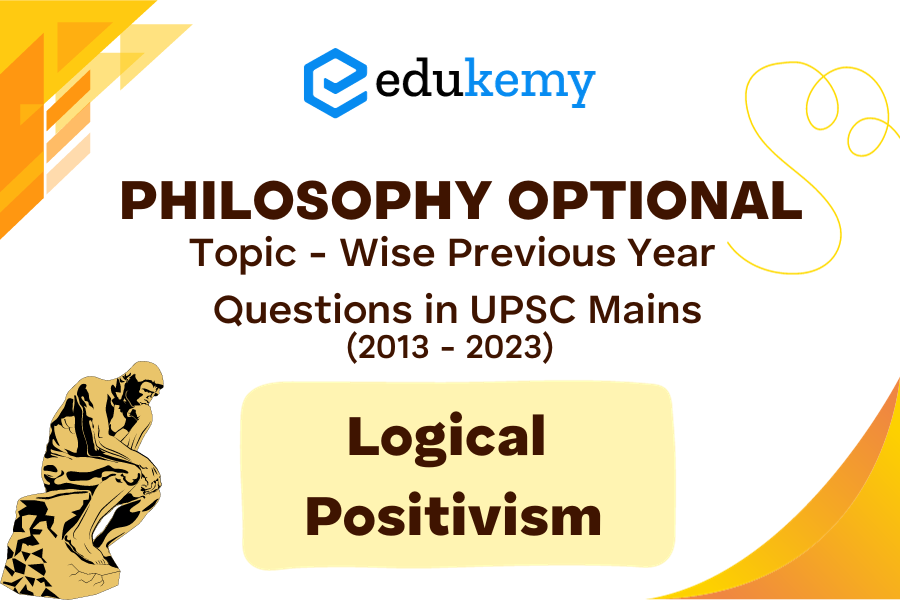
Delving into the vast ocean of knowledge that is the UPSC Mains examination, one particular optional subject stands out for its intriguing nature – Philosophy. Aspiring civil servants often find themselves grappling with philosophical concepts, seeking a deeper understanding of the world’s most profound questions. To aid in this quest for wisdom, we embark on a journey through the UPSC Mains’ previous year questions, particularly focusing on the intricate realm of Logical Positivism, covering the period from 2013 to 2023. In this blog, we’ll navigate the philosophical landscape, dissecting the questions that have challenged the intellect of UPSC candidates, while also unraveling the essence of Logical Positivism – a significant branch of philosophical thought that has left an indelible mark on the world of ideas.
Logical Positivism, also known as Logical Empiricism, represents a school of thought that emerged in the early 20th century, wielding a profound influence on both philosophy and science. Its proponents aimed to redefine the scope of philosophy by advocating for a strict verification principle and the elimination of metaphysical and pseudo-scientific claims. The relevance of Logical Positivism extends far beyond the philosophical realm, making it an essential topic for UPSC candidates to grasp. Join us as we embark on a philosophical voyage, exploring the questions posed by UPSC over the past decade, and unravel the intricate web of Logical Positivism’s principles and significance in the ever-evolving landscape of knowledge and thought.
Contents
- 1 Logical Positivism Philosophy – Previous Year Questions (UPSC CSE Mains History Optional)
- 2 FAQs on Logical Positivism
- 2.1 Q: What is Logical Empiricism in philosophy?
- 2.2 Q: Can you provide an example of a statement that adheres to Logical Positivism?
- 2.3 Q: What kinds of statements are considered meaningless according to Logical Positivism?
- 2.4 Q: How did Logical Empiricism influence the philosophy of science?
- 2.5 Q: Is Logical Empiricism still a widely accepted philosophical perspective today?
- 3 In case you still have your doubts, contact us on 9811333901.
Logical Positivism Philosophy – Previous Year Questions (UPSC CSE Mains History Optional)
1. Does the sentence ‘ whatever is coloured is extended ’, satisfy the criterion of meaningfulness proposed by the logical positivists ?Explain. (2017/15)
2. Explain verification theory. Does it lead to elimination of meta physics?(2016/10)
3. Are empirical statements verifiable ? Discuss the limitations of ‘verification theory of meaning’. (2014/20)
4. Distinguish necessary from empirical proposition. How is necessary proposition is justified? Explain (2013/10)
5. ‘Logical Positivism broadly claims that metaphysics and theology are meaningless because they are neither matters of logic nor verifiable empirically.’ Critically examine. (2012/12)
6. Discuss the limitations of verification theory. (2011/20)
7. Are necessary propositions linguistic by nature? Discuss in the light of logical positivism. (2010/20)
8. Examine how Ayer eliminates metaphysics. (2009/30)
9. Elimination of metaphysics at the hands Logical Positivists. Short Notes. (2007/20)
10. State and discuss the logical positivist’s attempts to eliminate meta physics. (2005/60)
FAQs on Logical Positivism
Q: What is Logical Empiricism in philosophy?
A: Logical Positivism, also known as Logical Empiricism, is a philosophical movement that emerged in the early 20th century. It emphasizes the importance of empirical verification and the rejection of metaphysical claims. It holds that meaningful statements must be either tautological (true by definition) or empirically verifiable through observation or experimentation.
Q: Can you provide an example of a statement that adheres to Logical Positivism?
A: Certainly! An example of a statement in line with Logical Positivism is “Water boils at 100 degrees Celsius at standard atmospheric pressure.” This statement is considered meaningful because it can be empirically verified through experimentation, aligning with the logical positivist requirement of empirical evidence.
Q: What kinds of statements are considered meaningless according to Logical Positivism?
A: Logical Positivism deems metaphysical, ethical, and religious statements as meaningless because they are typically not empirically verifiable. For example, the statement “God’s existence can’t be proven or disproven” would be considered meaningless from a logical positivist perspective.
Q: How did Logical Empiricism influence the philosophy of science?
A: Logical Positivism had a significant impact on the philosophy of science by promoting the idea that scientific theories should be based on empirical evidence and rigorous observation. This influence led to the development of a more rigorous and verifiable scientific methodology, ultimately shaping the way modern science is conducted.
Q: Is Logical Empiricism still a widely accepted philosophical perspective today?
A: No, Logical Positivism has largely fallen out of favor in contemporary philosophy. While it made important contributions to the philosophy of science and language, it faced criticism and challenges, which resulted in a decline in its popularity. However, some aspects of Logical Positivism still influence certain areas of philosophy and science, even if the movement itself is no longer a dominant force.
In case you still have your doubts, contact us on 9811333901.
For UPSC Prelims Resources, Click here
For Daily Updates and Study Material:
Join our Telegram Channel – Edukemy for IAS
- 1. Learn through Videos – here
- 2. Be Exam Ready by Practicing Daily MCQs – here
- 3. Daily Newsletter – Get all your Current Affairs Covered – here
- 4. Mains Answer Writing Practice – here

